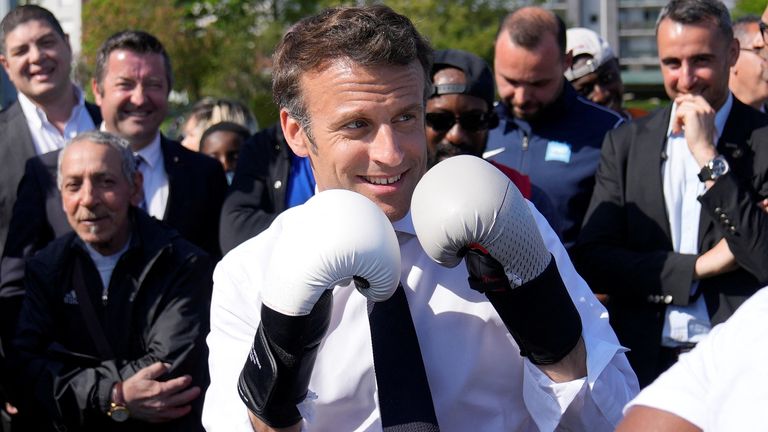[ad_1]
Marine Le Pen faces off against centrist incumbent Emmanuel Macron in France’s presidential election this Sunday, raising the prospect of the country electing a far-right leader for the first time.
Ms Le Pen has promoted ultra-conservative views, but she’s also put forward economic policies aimed at those who are struggling.
So, just how right-wing is Marine Le Pen?
New analysis from Sky News shows how her National Rally party compares to UK parties – and helps explain some of her popular appeal.
Knowing your left from your right
Sky News, using data from the Berlin Social Science Centre’s Manifesto Project, has compared the manifestos of 11 political parties, including Marine Le Pen’s National Rally party.
Typically these comparisons are made on a left-right political spectrum, where among other things, high taxation and a support for larger government are considered left-wing, and lower government intervention and the protection of traditional values are considered more right-wing.
Answer the questions below to see where some well-known parties sit on the scale.
Beyond left and right
It might be surprising that Ms Le Pen’s party – generally considered a far-right group – is positioned so close to the centre.
So what’s going on here?
One answer is that a populist leader like Ms Le Pen doesn’t fit neatly on to this simple left-right scale.
On economic policies, for example, many of her proposals would be considered left of centre. She has proposed expanding the welfare state for those deemed eligible and has offered tax breaks and interest-free loans to get on the housing ladder for people under 30.
On social and cultural policies alternatively, her policies are very much right of centre. When put together, she might seem like a centrist candidate not much different to Mr Macron of the La Republique En Marche party.
The chart below shows how far to the right she is of Mr Macron on issues relating to the “fabric of society” – which includes support for a traditional way of life and having strong law and order policies. It also shows she sits to the left of Mr Macron on economic policies.
Plotting these different policy positions together on a political compass helps to show the distance between different politicians’ views.
The chart below shows Ms Le Pen as an outlier in the upper left quadrant.
Professor Rainbow Murray, from the School of Politics at Queen Mary University, told Sky News that even Ms Le Pen’s economic policies cannot be so easily placed on the political map. They amount to a set of initiatives that incorporate both left and right-wing elements.
Prof Murray said: “The way that the far-right often manages to marry these two seemingly incompatible world views is by promoting relatively left-wing policies, but with a very nationalist dimension.
“So they might improve the welfare state for French nationals, but at the expense of anyone not regarded as fully French. Le Pen wants to change the constitution to legalise discrimination against immigrants and prioritise French nationals for employment and benefits. It sounds kind of left-wing but it’s also extremely authoritarian at the same time.”
A changing Le Pen?
The previous incarnation of Ms Le Pen’s party, then known as the Front National and led by her father until 2011, sat more clearly to the right on economic policies.
The shift to the left on these issues has helped her appeal to lower-income voters.
However, Ms Le Pen has not just shifted on these policies but has also changed her campaigning style to appear less belligerent, dubbed “the kitten campaign” by the French press.
An analysis of the victory speech given by Ms Le Pen after making it through to the second round of the election earlier this month shows softer language being used – ambition, people, nation and French were among her most-used words.
The use of the word “French” is one key difference to Mr Macron’s equivalent speech, where he used the word only twice, compared with Ms Le Pen’s usage of it 11 times.
It hints at the central theme of Ms Le Pen’s policies and what ultimately defines her status as being of the “far-right” – a nationalistic view of who gets to call themselves French. And while the language around this debate might have softened, the policy hasn’t.
Are these changes working?
Ms Le Pen does seem to be becoming more palatable to the electorate. While four in five people placed her to the most extreme right in survey responses in 2017, the same figures fell to fewer than three in four this year.
One explanation for this is that the presence of a candidate even further to the right, Eric Zemmour, in the first round of the election made her position seem less extreme.
Another is that the ‘softening’ of Marine Le Pen has convinced people this change has also been matched in policy.
Prof Murray said: “She’s been trying for a long time to soften that party’s image to make herself seem more acceptable to voters and to detoxify her party’s brand.
“I think having the mainstream right match some of her arguments, and having Zemmour appear on her right flank has made her seem more moderate. But I think it’s an illusion. I don’t think she’s changed all that much.”
Reporting: Kieran Devine, Daniel Dunford, Jack Taylor, Lauren Pinkney
The Data and Forensics team is a multi-skilled unit dedicated to providing transparent journalism from Sky News. We gather, analyse and visualise data to tell data-driven stories. We combine traditional reporting skills with advanced analysis of satellite images, social media and other open source information. Through multimedia storytelling we aim to better explain the world while also showing how our journalism is done.
[ad_2]
Source link










